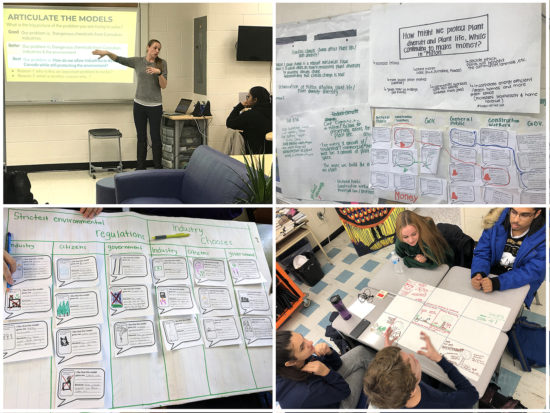Student conversations to impact sustainable schools

Milton District High School (Halton District School Board)
Milton, Ont.
IN A NUTSHELL
A group of teachers have teamed up to deliver Integrative Thinking – a method for guiding classroom conversations and projects – with a focus on scientific discovery. Students tackle “wicked problems” such as access to clean water, invasive species, maintaining biodiversity, and beautifying the school campus using this design thinking process. They will share their learning through student-led “open space” exhibitions to expose more youth to this innovative problem-solving approach.
THE SCHOOL COMMUNITY
Milton District High School is a diverse school of 1200 students who speak over a dozen different languages.
At the district level, Halton District School Board (HDSB) has placed special emphasis on encouraging teaching innovation, with a designated Superintendent of Innovation and Ingenuity and a board-wide initiative (SHIFT)1 to support and challenge teachers to inspire deeper learning in their students.
PROGRAM GOALS
This project aims to realize the potential of science studies to ignite a sense of discovery, quest and curiosity. Traditionally, science is taught through lectures, quizzes, labs and tests. i-Think, by contrast, sees knowledge as a tool that allows students (and anyone) to create, rather than as the end point of assessment. Bringing an integrative thinking (i-Think) environment to the science classroom puts an emphasis on applying knowledge and creative critical thinking to real-world problems. The end goal is students who are engaged and excited about learning, creative thinkers and effective problem solvers. The flexible tools and skills they learn can be used with any subject matter and as they head into the future.
PROGRAM DESCRIPTION AND RESULTS
Starting in September of 2018, five teachers from Milton District High School worked in partnership with the Rotman School of Management’s i-Think initiative, as well as HDSB SHIFT Innovation Coaches and Program Leaders for Science and Mathematics, to bring the i-Think approach to science class.
To support this new approach, HDSB’s SHIFT initiative created a demo classroom for 21st century learning at Milton DHS. The pairing of the i-Think initiative with this inviting, flexible classroom space invites collaborative and creative thinking.
Based on the idea that the most important role that educators can play is to teach students the skills necessary to solve “wicked problems,” the program asked students to look around their school community and identify environmental issues and problems. Some students looked at the prevalence of weeds in the courtyard, some talked about access to clean drinking water, others explored invasive species and biodiversity. The i-Think process of seeking to understand the problem and identify solutions builds empathy and consensus with all stakeholders.
At the end of their inquiry, students were eager to implement their solutions and asking, “what’s next?” Grade 9 teacher Jennifer Pratt says, “This program has given me the tools to become more of a classroom facilitator, and as a result students have shown their curiosity to learn. They are excited to work with other students each day, which has created a more positive and inclusive classroom environment.”
In just two months, participants observed transformative change in their classrooms, with teachers using more creative lessons and methods, and students valuing the thinking process and using deeper language to talk about and share their thinking.
OUTREACH AND NEXT STEPS
The Milton team is part of a board-wide initiative for Grade 7 to 12 Science teachers. There is a great deal of interest and enthusiasm for the program, and many teachers at both the elementary and secondary level are eager to become part of the scientific exploration. Currently there are 25 staff and over 700 students who have participated in this program at their schools. More scaling up is planned as the board builds capacity to support this type of pedagogy.
At Milton DHS, several teachers have asked to shadow the Integrative Thinking classes in order to learn to implement the program themselves. Teachers in non-science subjects are also looking to incorporate Integrative Thinking into their courses. The five teachers plan to share their learning throughout the board and province by presenting at Professional Development days and Provincial subject conferences. They also plan to host student-led “open space” exhibitions to engage more youth into using design thinking projects to solve “wicked problems.”
Related learning:
Learn more about Integrative Thinking
Related EdCan Article:
Cultivating an Opposable Mind: A case study in Integrative Thinking
In the media
Milton teachers recognized with national award for innovation in teaching science – via Inside Halton
Here’s Why Milton District High School Was Recently Recognized – via In Halton
Milton high school among EdCan Award honourees for science program – via Global News
Notes:
1 For more info on Halton District’s SHIFT initiative and a tour of Milton DHS’s demo classroom.
